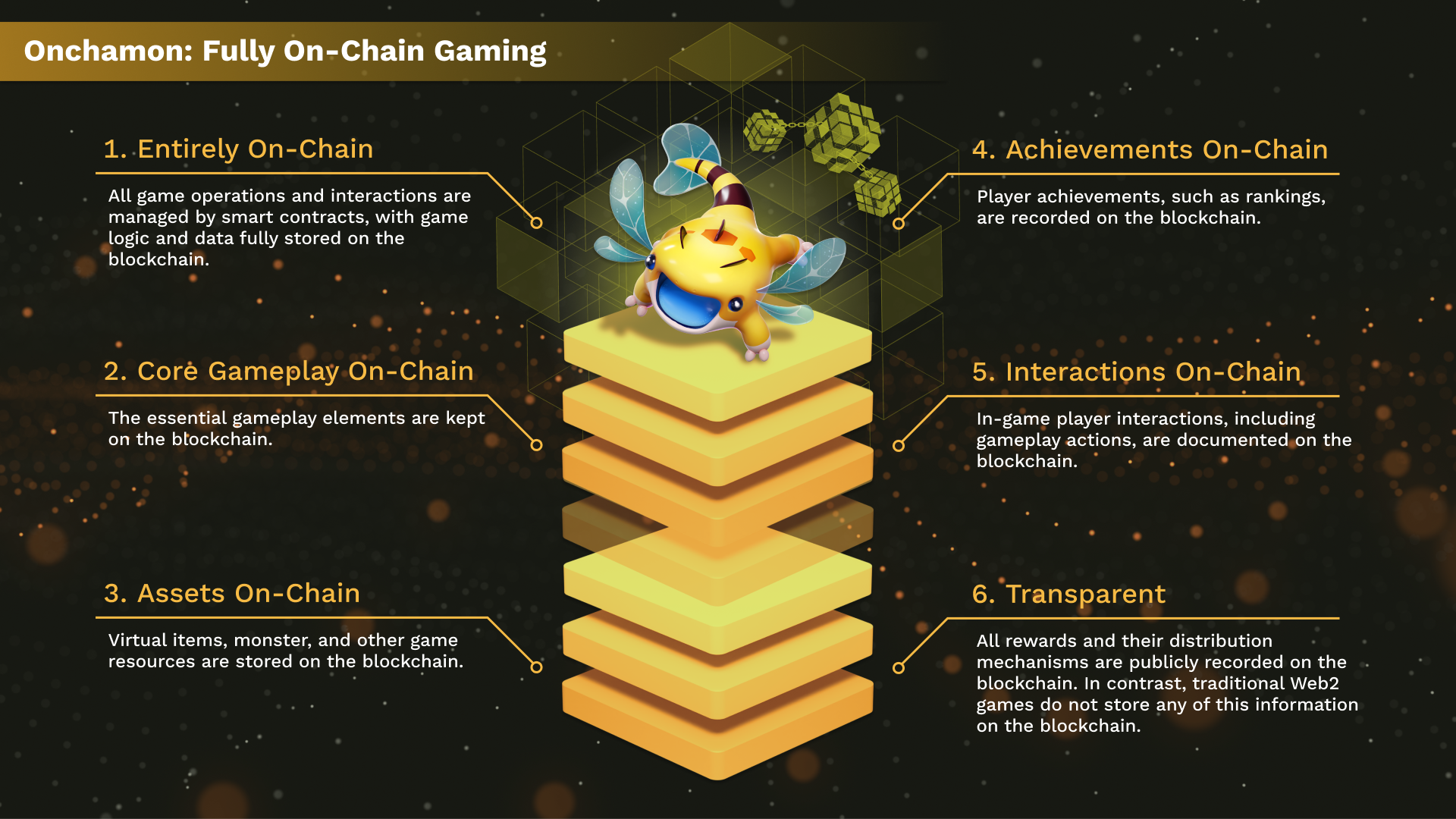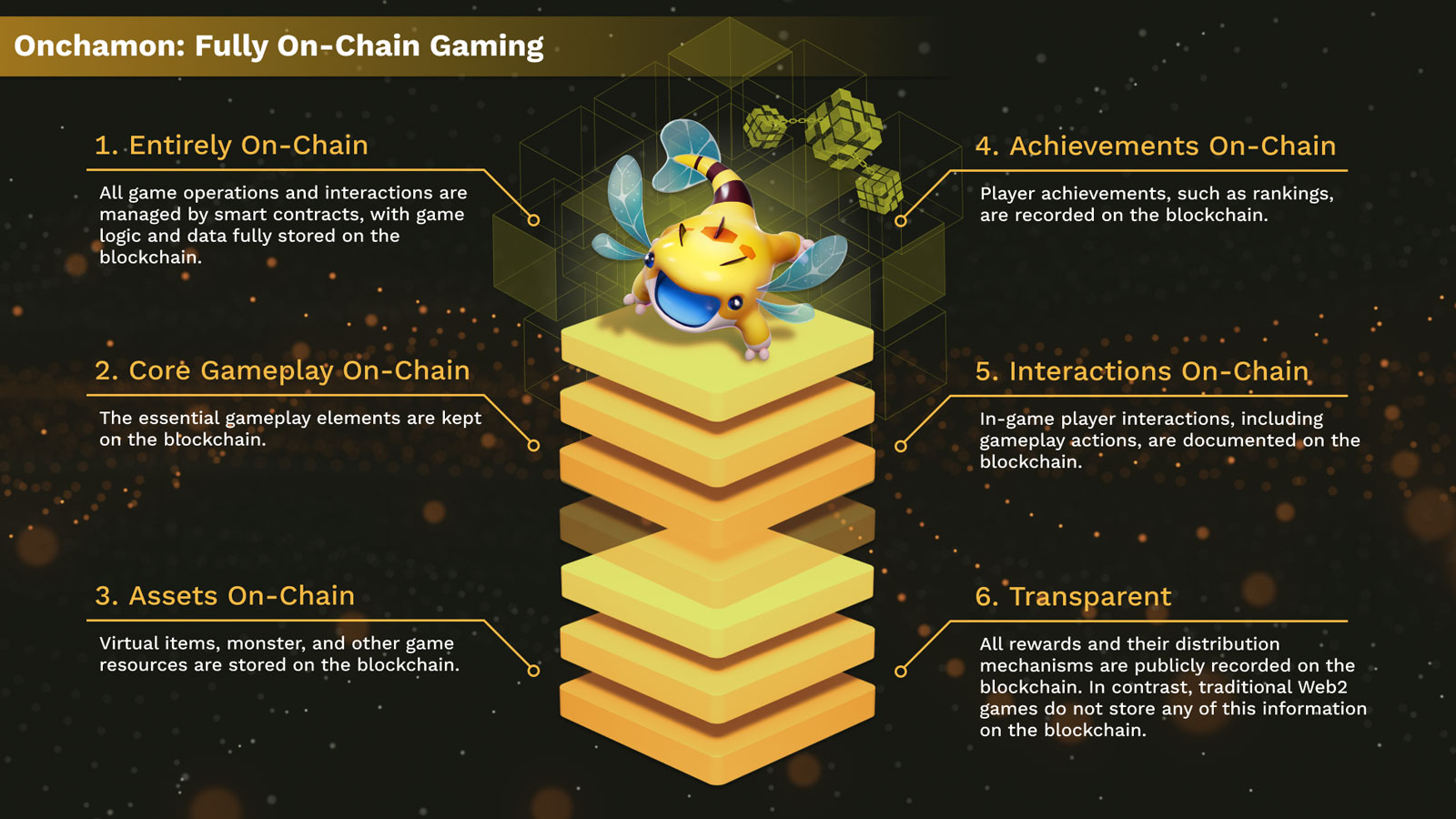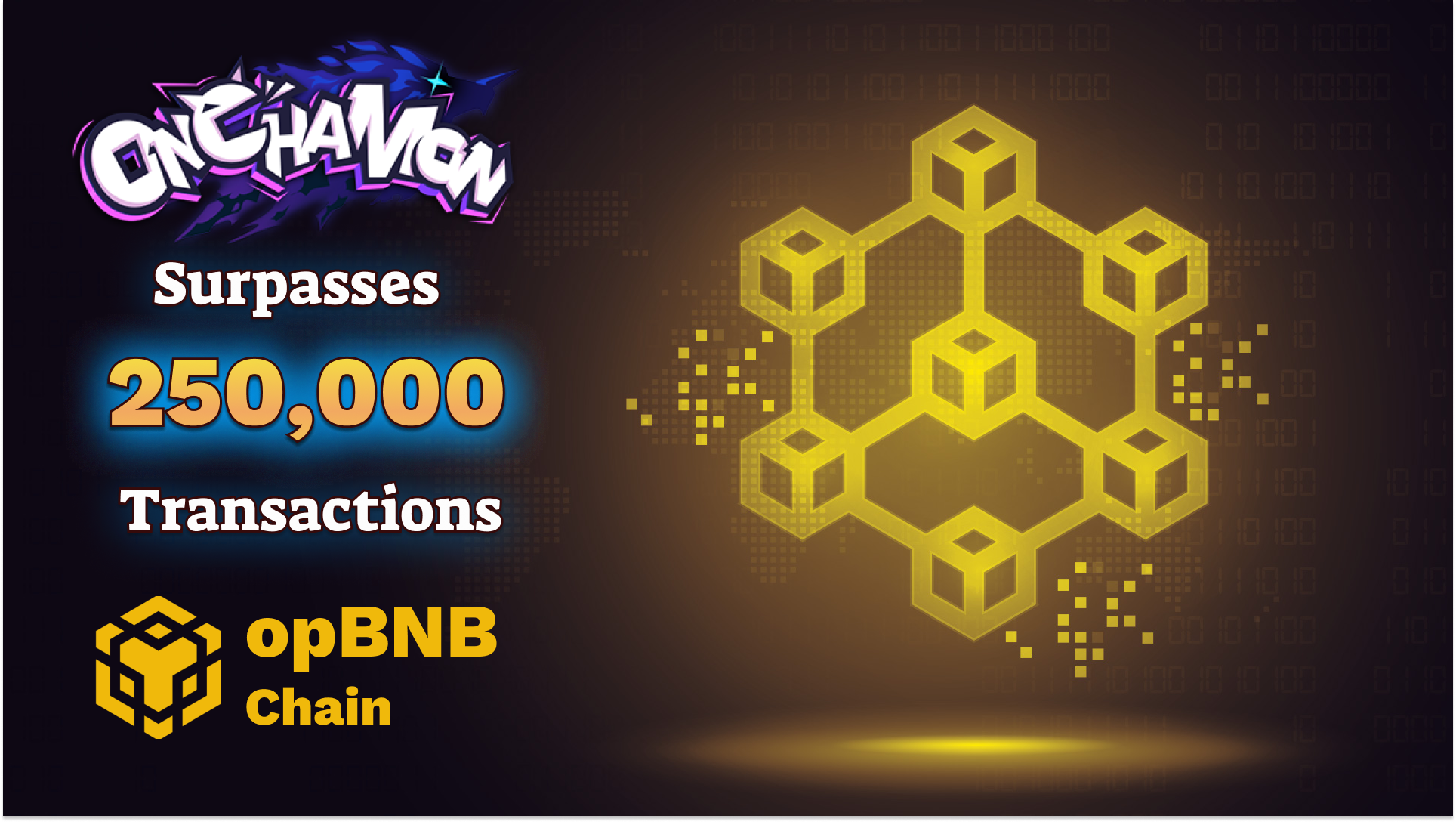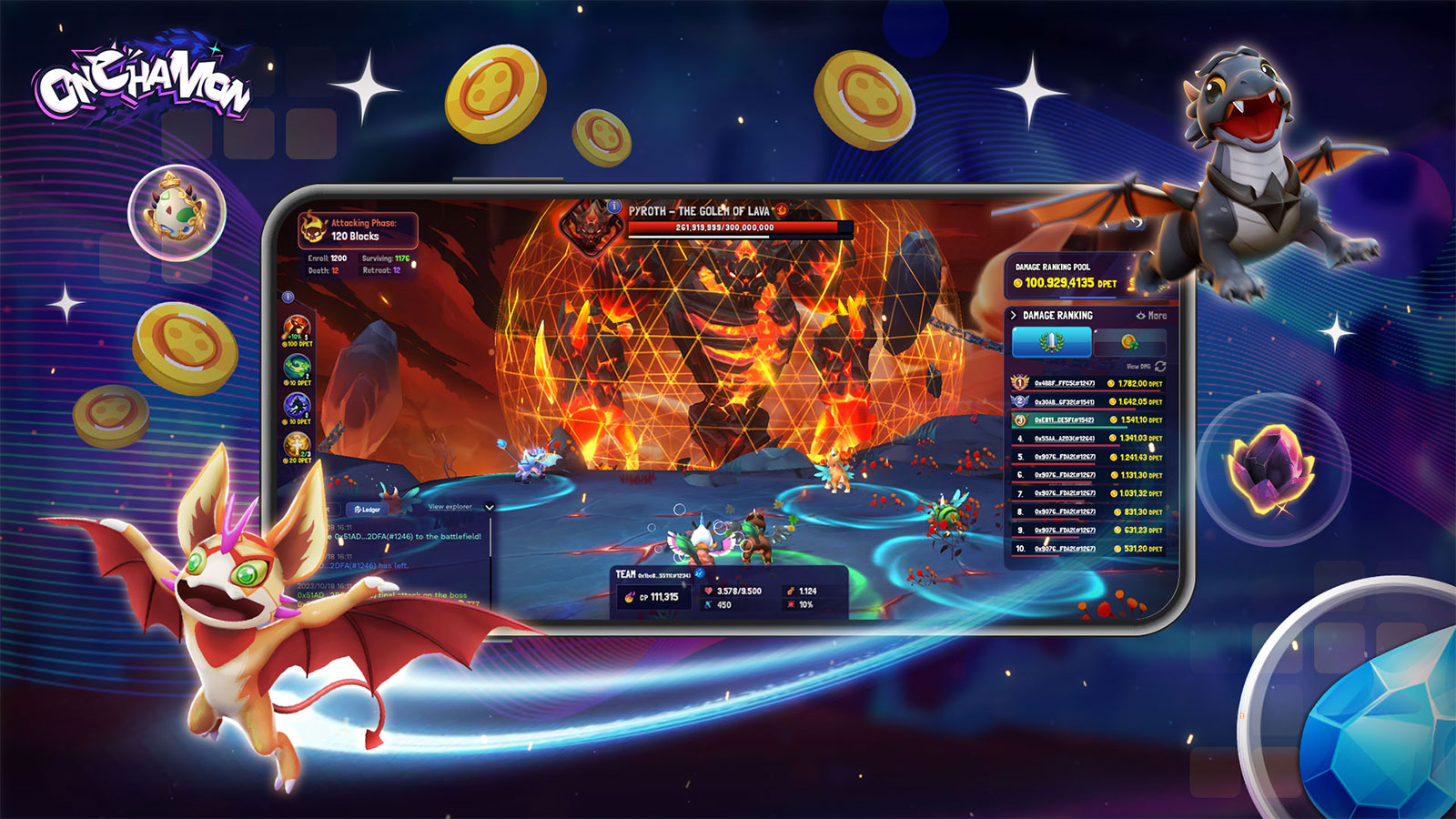Web3 – Fully On-chain Games
The world of fully on-chain games (FOCG) is still developing compared to the established Web2 game industry. This means the FOCG value chain isn’t as detailed yet. However, the relationships between the different parts of the blockchain gaming value chain are similar to those in Web2 gaming.
The FOCG value chain can be divided into four main parts, just like in Web2 games:
- Infra Layer: The foundational infrastructure.
- Middleware Layer: Software that connects the infrastructure to the game.
- Tool Layer: Tools used for game development and management.
- Game/Autonomous World (AW) Layer: The actual games and autonomous worlds.
What Is On-Chain Game?
On-chain games are a new type of game that runs entirely on blockchain technology, except for the game’s frontend, which is the part players see on their screens.
In these games, all player actions and data are recorded directly on the blockchain, not on traditional game servers. This includes game logic and state information (like player names and ranks), which are stored in smart contracts on the blockchain.
The key difference between on-chain games and traditional blockchain games is that in on-chain games, everything is decentralized and stored on the blockchain, ensuring transparency and security. For a game to be considered truly on-chain, all its logic and data must be on the blockchain.
How Does On-Chain Gaming Work?
On-chain gaming operates entirely on blockchain technology, apart from the frontend, which is the part of the game that players see and interact with. On-chain games use smart contracts (self-executing code on blockchains) to manage all game logic and data.
In an on-chain game
- Player actions and data: All game data, such as player actions and game state, is stored on the blockchain, not on traditional game servers.
- Game logic: The game’s rules and mechanics are implemented using smart contracts. These are the rules of the game. For example, in an online trading card game (TCG), the game logic dictates how matches start, which cards can be played, and when a match ends. In on-chain games, these rules are set using smart contracts.4
- Game state: Information like player names and ranks is stored directly on the blockchain.
This setup differs from traditional blockchain games, which often use centralized servers to store game data and only connect to the blockchain for certain elements, like NFTs. In on-chain gaming, everything is decentralized, ensuring greater transparency and security.
A diagram shows the difference
- Traditional blockchain games: Use both game servers and smart contracts.
- On-chain games: Use only smart contracts and blockchains.
Smart contracts also handle the creation, distribution, and transfer of digital assets like NFTs (non-fungible tokens). In a TCG, these digital assets would be the trading card NFTs.
Challenges of On-Chain Gaming
On-chain gaming faces several significant challenges, making it difficult for developers and players to work within its technical limits.
-
Blockchain Speed and Scalability
Speed and Scalability Issues: Blockchains are like global computers run by many people, which makes them slow and hard to scale. This is why on-chain games are mostly turn-based, like trading card games or strategy games. Faster games, like MOBAs or FPS games, can’t run well on current blockchain technology.
-
Transparent Player Actions
Lack of Privacy: Smart contract transactions are public, which is good for financial transparency but bad for game design. For example, in games that hard to rely on hidden information to make better experience during gameplay.
-
Botting
Bot Problems: Without a central authority to prevent cheating, bots can easily play on-chain games. This can ruin the experience for players, especially when rare digital assets like NFTs are prizes.
-
Technical Limitations
Randomness and Automation Issues: Blockchains and smart contracts have strict security rules that limit what they can do.
Randomness: On-chain randomness can be manipulated by network validators.
Automation: Automating game actions (like collecting resources) is not natively supported by blockchains.
Benefits of On-Chain Games
Despite the challenges, on-chain gaming offers many advantages that come from using blockchain and smart contracts.
-
Reusable and Open-Source Building Blocks
Reusable Game Logic: On-chain games are fully on-chain, allowing players and developers to reuse game logic to create new games, build different interfaces, and develop applications to enhance gameplay.
Endless Creativity: Like Dungeons & Dragons, on-chain games have a set of rules that can be built upon endlessly, offering endless creative possibilities.
-
Decentralization, Lasting Digital Presence, and Unchangeable Records
Self-Sustaining: Once on-chain, these games can run independently.
Long-Term Existence: On-chain games have digital permanence. As long as the blockchain exists, the game will too, potentially lasting hundreds of years.
-
Safe Space for Technical Innovation
Testing Ground: On-chain games provide a safe environment for developers to test new technologies, like zero-knowledge proofs, without the high risks associated with other blockchain applications.
-
Variety in Visual & Games
Flexible Frontends and Games: Since blockchains and smart contracts handle the backend, developers can create multiple frontends (visual interfaces) and playing mechanism for the same game. This means one game can have different themes and game play, to make the game cool and fun, depending on the game used.
Onchamon On-chain Financial Strategy Game
Onchamon is a prime example of a fully on-chain game, utilizing blockchain technology to enhance transparency, security, and player engagement. In Onchamon, every aspect of the game, from player actions to game data, is recorded and managed on the blockchain. This decentralized approach offers several unique advantages:
-
Transparent Gameplay
Visibility: All player actions and game events are transparently recorded on the blockchain, ensuring fair play and accountability.
Integrity: The immutability of blockchain data prevents cheating and ensures that the game’s rules are consistently enforced.
-
Secure Digital Assets
Ownership: Players truly own their digital assets, such as monsters and items, because these assets are represented as NFTs on the blockchain.
Transferability: These assets can be traded or sold securely and transparently, providing real value and liquidity to players.
-
Decentralized Control
Autonomy: Onchamon operates without a central authority, relying on smart contracts to execute game logic. This decentralization ensures that the game can function independently and continuously as long as the blockchain exists.
Community Governance: Players can have a say in the development and evolution of the game through decentralized governance mechanisms.
-
Enhanced Gameplay Mechanics
Innovation: The blockchain infrastructure allows for the implementation of advanced game mechanics, such as provably fair randomness and automated event triggers.
Integration: Developers can build additional layers and features on top of the existing game, fostering a rich and evolving game ecosystem.
Onchamon Games
Onchamon Games that build on opBNB
Join Onchamon: https://play.onchamon.com/

EggVenture: Trainer begin the journey to discover unique Oncha-egg NFT, all tracked on the blockchain for authenticity and rarity.
Egg Hatch: The process of hatching eggs and bringing new Monsters NFT to life is governed by smart contracts, ensuring fairness and transparency.
Training Ground: Training and upgrading monsters is recorded on-chain, providing an immutable record of progress and earn rewards.
RaidBoss: Trainer set up your team and send their monsters on quests, battles, and competitions, with all outcome, achievements and rewards securely stored on the blockchain.
Battle Arena: Enter the Battle Arena and pit your fully on-chain monsters against other players in intense, head-to-head combat. Prove your strategy and claim victory in the ultimate showdown, with every action and outcome, rewards transparently recorded on the blockchain.
By fully leveraging blockchain technology, Onchamon creates a dynamic and trustworthy gaming experience where players have true ownership and control over their game assets, and where the game world is continuously enriched by community contributions and innovations.


